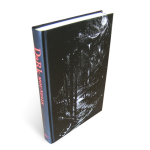 In a recent blog post, Paul Kingsnorth, one of the founders of the Dark Mountain Project wrote:
In a recent blog post, Paul Kingsnorth, one of the founders of the Dark Mountain Project wrote:
At the time and on the surface, what I thought I was doing was quite simple: I was starting a new literary movement. With Dougald, my co-conspirator and soon-to-be friend, I had written a strange little manifesto, which demanded that its readers open their eyes to the huge shifts which our world was undergoing, and then start to write as if they were real. This was always supposed to be an artistic rather than a political document. For me, its inspirations were not Leninists or Maoists but Dadaists and Vorticists. Like its forebears a century ago, I wanted this manifesto to emerge from the collapse of the old world and herald something new.
Despite this grand and probably self-regarding ambition, the movement I envisaged emerging from this little document was to be something quite modest. I thought we might get a writers’ circle together, perhaps. Maybe we’d meet every couple of weeks in the pub, ten or 20 of us, and talk about how to bust open the rotten citadels of literature and pour the healing waters of uncivilisation down upon its thirsty inhabitants.
Well, five years on, it’s a bit different. There have been festivals, several weekend workshops, a world wide on-line network, an album, and five beautiful hardback books. Speakers have attended literary festivals, and poets published by Dark Mountain had a very successful showcase at the Wenlock Poetry Festival.
Now the fifth book is out and the sixth is in preparation, and there’s a feeling that it’s time to pause and evaluate.
Paul Kingsnorth opens his editorial with the question ‘Is there anyone left who actually believes in progress?’ justifiably expecting the answer ‘no’. What with the economic recovery actually benefiting only the people who were never hurt by the crash in the first place, social inequality growing by the day, war and environmental collapse causing mass migrations and bringing news of loss and sorrow by every newscast, government hostility to the poor, the old and the sick no longer even a surprise, and cultural activity tolerated only as window dressing for an economic model more ruthless and complacent than anything we’ve seen yet, it would be hard to disagree.
But that exclusive understanding of progress – everyone getting richer and safer and healthier and man controlling the world through science and technology – is a very narrow definition, and one that’s only been current for a relatively short time. Before the Renaissance, people believed our history was of decadence rather than progress – our predecessors were giants, we are their unworthy heirs. And when the Renaissance hit, progress was seen at first in personal terms – spiritual, artistic and intellectual – and came with a combination of snobbery and contempt for materialistic values that boded no good for the poor and the alien.
It took the Enlightenment to bring about the market economy and all its works and pomps, and it’s fair to say that it looks pretty much like a busted flush now. But with its fifth volume, the Dark Mountain project shows signs of moving on from analysing or lamenting the demise of the old order, and there are already hints of a kind of progress we might want to believe in – art, literature, philosophy and political thinking which might broaden the base from which we consider our life on the earth, and come up with a way of living less detrimental to cultures and species outside our own chosen interest group.
All of which sounds a bit heavy, and some of the work in this book undoubtedly is – there’s some very heavy-duty and learned philosophy, anthropology and political science in there. But also travel writing, poetry, artwork – very beautiful artwork under the auspices of Charlotte Du Cann, the new art editor – short stories, including science fiction and fantasy and life-writing. The outstanding work from my point of view is Matt Szabo’s essay From Iron Cage to Willow Cage, which covers brilliantly some of the ideas I was cooking up about learning and knowledge back here, but there’s loads more. Essential reading for anyone interested in the way we live.
Leave a Reply